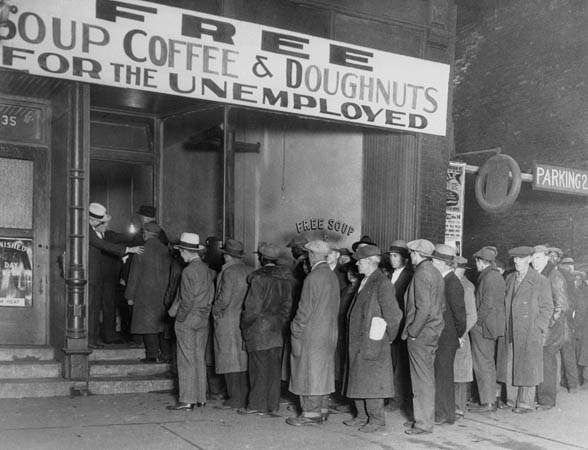A Brief Timeline of Financial Crisis
If you’re not learning from the past, chances are you’re doomed to repeat it. That’s why it’s so important that we all learn from the financial crisis and the mishaps of the past, from the recent “Great Recession” of 2008 all the way back to the 1772 credit crisis. Here’s a closer look at some of the great financial crises and what we need to take out of all of them:
A Timeline of Financial Crisis
16 Nov 1930, Chicago, Illinois, USA — Notorious gangster Al Capone attempts to help unemployed men with his soup kitchen “Big Al’s Kitchen for the Needy.” The kitchen provides three meals a day consisting of soup with meat, bread, coffee, and doughnuts, feeding about 3500 people daily at a cost of $300 per day. — Image by © Bettmann/CORBIS
- Crisis of 1772: Originating in London and then spreading throughout Europe, the crisis stunted economic growth and led to the failure of 20 banks.
- The Great Depression: Fueled by a drop in stock prices in September 1929 and a full-blown stock market crash less than two months later, the Great Depression had a major impact on the entire world. Worldwide GDP fell by 15 percent, trade plummeted and unemployment skyrocketed. Many economies didn’t recover until World War II began.
- 1973 Oil Crisis: Due to perceived support of Israel during the Yom Kippur War, OPEC embargoed oil to a variety of Western nations, including the U.S. This embargo caused oil prices to skyrocket from $3 a barrel to $12 worldwide. A second crisis occurred in 1979.
- 1997 Asian Financial Crisis: With Thailand bankrupt, crisis spread throughout much of Asia in 1997, often raising concern that it could spread worldwide. The crisis was plagued by low currency, devalued stock markets and an increase in private debt. Debt-to-GDP ratios also climbed.
- The Great Recession: Though this recession lasted less than two years, the effects were devastating. A financial crisis and subprime mortgage crisis was the perfect double whammy for this recession, so much so that the financial sector was in great peril (that is, before the banks were bailed out). The housing market tanked and manufacturing slowed to a trickle, forcing a variety of bankruptcies and closures.
So what can we learn from the various crises of the past? Lots. For instance, don’t invest all of your money in one entity – diversify it. Secondly, it’s always a good idea to take the appropriate measures to ensure that you’re debt free. Not only does this keep your credit score and borrowing power high, but things are less likely to snowball on you in times of uncertainty. And finally, live frugally. Don’t borrow any more than what you need – and only do it when you need it.

